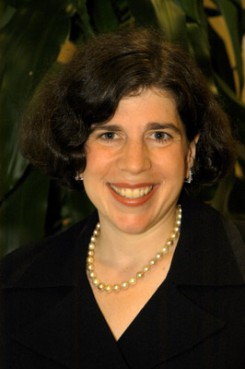
(RNS4-MAY05) Rabbi Julie Schonfeld, executive vice president of the Conservative Movement’s Rabbinical Assembly, remains concerned about a proposed Israeli law to ease the conversion process, but which would also codify the authority of Israel’s (Orthodox) Chief Rabbinate. For use with RNS-JEWS-CONVERT, transmitted May 5, 2010. RNS photo courtesy Rabbinical Assembly.
JERUSALEM (RNS) Following recent face-to-face meetings with Israeli officials in New York, leaders of North America’s non-Orthodox Jewish movements said a bill aimed at easing Israeli conversion laws would marginalize non-Orthodox Jews who struggle for equality.
Representatives of the Reform, Conservative and Reconstructionist movements said the bill will strengthen the ultra-Orthodox establishment’s authority over Jewish matters at the expense of non-Orthodox Jews.
Throughout Israel’s 62-year history, sole authority over all Jewish religious matters has been given to the Chief Rabbinate, an Orthodox body. As a result, marriages, divorces and conversions performed by non-Orthodox rabbis have no legal standing.
The bill, which was introduced by Knesset member David Rotem of the Yisrael Beiteinu political party, is an attempt at easing the arduous conversion process for hundreds of thousands of non-Jewish immigrants, who must pass muster with rabbis on the Orthodox Conversion Court.
The current system is exceedingly slow, and the conversion rabbis — who are accountable only to the Chief Rabbinate — require potential converts to live a strictly religiously lifestyle, even though the vast majority of Jewish Israelis are not themselves Orthodox.
Many Orthodox rabbis no longer automatically accept even Orthodox conversions performed outside Israel, and some have even revoked some conversions.
In a joint statement, the U.S. Jewish leaders lauded Rotem’s attempts to “ameliorate the bottleneck” in the conversion process by empowering local rabbis to perform conversions, but asserted that a provision to codify the Chief Rabbinate’s authority into law would have “devastating ramifications.”
Such a move would make it all but impossible for non-Orthodox Jews to petition for equal rights through Israel’s High Court of Justice, which they said “has been the single mechanism to counter religious discrimination in Israel.”
In addition, the leaders said, the bill offers no alternative method of conversion via non-Orthodox streams.
” We — and more importantly, our Israeli colleagues and their lawyers — believe that this language, if adopted as written, would further marginalize and hamper the Masorti (Conservative) and Reform movements in Israel,” the U.S. leaders said in a statement.
“This would be a tragic consequence as we offer vibrant religious alternatives to a nation of Jews religiously alienated by the increasingly extreme positions of a minority religious establishment.”
(BEGIN OPTIONAL TRIM)
Part of the dispute centers around Israel’s Law of Return, which grants automatic citizenship to anyone who can prove one of their grandparents was Jewish. U.S. leaders said they were “troubled” by a clause that bars automatic citizenship to people who undergo an Israeli conversion if they were ineligible under the law prior to their conversion.
The Rabbinate does not recognize non-Orthodox conversions as Jewish, regardless of where they occurred. Israel’s Interior Ministry permits such converts to immigrate, provided their conversions took place outside Israel.
(END OPTIONAL TRIM)
While the leaders acknowledged Rotem’s desire to prevent illegal immigrants from converting solely for the purpose of gaining citizenship, they said it unjustly “differentiates between those who are born Jewish and those who choose to be Jewish.”
Rabbi Julie Schonfeld, executive vice president of the Conservative Movement’s Rabbinical Assembly, said from New York that she and other leaders reminded the Israelis that “85 percent of Diaspora Jewry is not Orthodox, and is largely represented by the Conservative and Reform streams.”
Should the bill pass, Schonfeld said, “it could drive a wedge between Israel and the Diaspora.”
Rabbi Seth Farber, director of ITIM, a Jerusalem-based organization that assists converts, said that a conversion law needs to be passed “because the immigrants represent a demographic time bomb and threaten the Jewish character of the State of Israel.”
Even so, Farber has grave reservations about Rotem’s bill because, in his view, the new pool of local rabbis “will be completely subservient to the political entity known as the Chief Rabbinate. If a rabbi wants to advance in the rabbinate but is viewed as liberal toward converts, he will never be promoted,” Farber predicted.
Rotem’s office declined requests for an interview, but he did tell the Jewish Week newspaper in New York that his bill “has nothing to do with American conversions. I think they are fighting a war for the wrong purpose.”
“I don’t like it when people tell me that their support for the State of Israel hangs on this. … I don’t like those kind of threats.”
Although worried about the bill’s implications, Rabbi Eric Yoffie, president of the Union of Reform Judaism, termed the dialogue between the U.S. and Israeli officials “a dramatic event.”
“Rotem came and truly listened, for several days and learned about the Diaspora community,” Yoffie said. “We’re pleased about that.”




